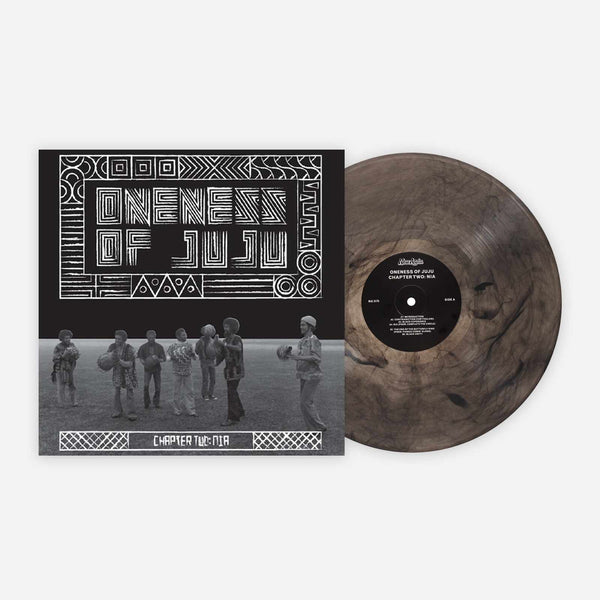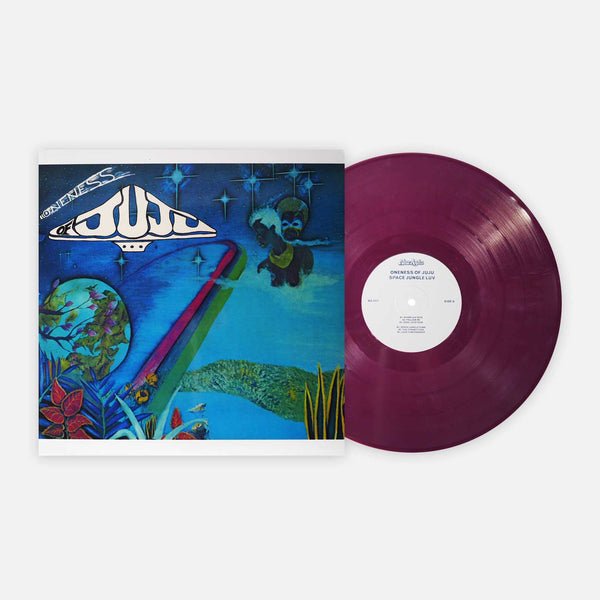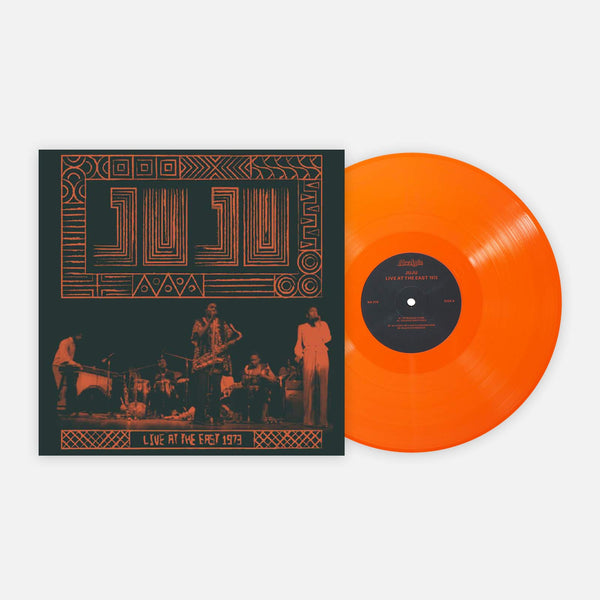Oneness Of Juju Were The Collision Of Jazz, Funk, African Music And The Avant-Garde
We Talk To Founding Member James ‘Plunky’ Branch About The Group’s Legacy And New Reissues
May is Black Fire Records month at Vinyl Me, Please, as we’re featuring Free Yourself, the debut LP from Washington, D.C., funk/go-go band Experience Unlimited as our Essentials Record of the Month and, in addition, are featuring four color reissues of seminal works — Chapter Two: Nia, African Rhythms, Space Jungle Luv and Live at The East 1973 — by Oneness of Juju, a Richmond, Virginia, band that was an intersection of many strains of black music in the ’70s, and whose work has been intermittently out of print on vinyl. Learn more about Experience Unlimited’s debut over here, and below, you can read an interview with James “Plunky” Branch, the saxophonist at the center of Oneness of Juju.
It takes only 90 seconds of “African Rhythms” for you to realize you’re listening to something different, something distinct. Layers of percussion — including the insane bongo line — give way to a spoken word intro. Then a bass line so bouncy it could serve as a gymnastic trampoline comes in, followed by improv saxophone wails and chants. It’s like a Fela Kuti album played by Parliament, a go-go album made by a drum circle. Those 90 seconds have been a favorite of crate-diggers and comp makers for the better part of 45 years, and they come from Oneness of Juju, a Richmond, Virginia, band spearheaded by their saxophonist James “Plunky” Branch.
Originally started in San Francisco in 1969 as an avant-garde jazz group playing over African, Afro-Cuban, and Afro-Brazilian rhythms and inspired by Pharaoh Sanders, Ornette Coleman, and Mongo Santamaria, their jazz stood against the modal contexts of other artists on the left, as their music always had a bopping rhythmic component. They opened for Ornette, and for Sam Rivers, and other experimental jazz artists, before moving to Richmond, Virginia, and changing their sound.
“In the Richmond, Virgina, area, there was not as much of a market for avant-garde jazz as you might think,” Plunk says with a laugh over the phone. “So we incorporated some R&B elements, and a drummer playing a drum set, and a guitar, and added a female vocalist. We had to meet our audience halfway. We started bridging this line between R&B and funk and avant-garde jazz. I was conscious of trying to find an audience for the message we had in our music, and trying to serve the community and make a living, which is how we ended up with this convergence of styles.”
That meeting the community halfway was important in those days, because often political demonstrations, Black Panther rallies, and Malcolm X and MLK Days were the best gigs that Oneness of Juju — and Experience Unlimited, for that matter — could score in Richmond and D.C.
“There were not that many commercial places for us to play in those days, and not many people were looking for shows with bands like ours to see in a club” Plunky says. “So political rallies were a two-way street for us. People used our music to gather people around, and we used those rallies to expose ourselves to people in the audience; you can’t reach your audience at the local bar, so we went to where people were. We provided free entertainment, and were able to play to hundreds and thousands of people. Our music was “commercial” and danceable enough, and had a message of empowerment, so we were perfect for those rallies; we built an audience through those.”
That audience eventually landed Oneness of Juju at Black Fire Records, an indie label started by an old Strata East — the label mostly known for issuing Gil Scott-Heron records — D.C. distributor named Jimmy Gray. Plunky met Gray when he moved to Richmond because Gray had cribbed a logo for his original Black Fire magazine from a Juju record, and after meeting, they hatched a plan to start a label to distribute the unique records coming out of the D.C. area. The label had the radical idea of splitting all profits with the band 50/50, a model that would be replicated for basically every indie rock label since.
The first LP on the label was Oneness of Juju’s African Rhythms, a collision of funk, R&B and Plunky’s avant-garde saxophone wails, and the label’s third LP was Space Jungle Luv, a more mellow, soft-jazz album from Oneness. The fourth LP was Experience Unlimited’s Free Yourself. Known to collectors for their distinct afro-centric art, they’ve been hot commodities for vinyl DJs and rap producers. The label’s output turned down to a trickle in the late ’70s and ’80s as the bands got upstreamed to bigger distributors and labels. When Gray died in the late ’90s, it seemed like the history of Black Fire might disappear, but Plunky swooped in to buy out Jimmy’s half of the label from his family, and to gain control of all of the masters.
“Much of the work of promotion in the old days was very hand-to-hand; I was driving up and down the East Coast to talk to distributors and record store owners. It was physically going to radio stations to try to get airplay. A lot of work went into us making those records happen,” Plunky says. “In those days, home studios did not exist; we had to record the album in the middle of the night to save money. Twenty years later when Jimmy died, I’m not just going to let that work disappear, you know? It had so much cultural relevance to the Mid-Atlantic region, and D.C. culture, and it captures what it was like at that time. This music was historically important. It’s the precursor to go-go music, it’s the history of indie music, it’s the history of the Black Arts Movement.”
Vinyl Me, Please is presenting four Oneness of Juju records this month to keep that history alive. In addition, along with Okayplayer and Red Bull Music Academy, we’re presenting an event at the Okay Space in Brooklyn, New York, on May 9. It will feature a multi-media experience featuring Black Fire Records album art, paintings, photos, memorabilia, a Q&A with Plunky and Jeff “Chairman” Mao from Red Bull Music Academy and a vinyl DJ set.
Andrew Winistorfer is Senior Director of Music and Editorial at Vinyl Me, Please, and a writer and editor of their books, 100 Albums You Need in Your Collection and The Best Record Stores in the United States. He’s written Listening Notes for more than 30 VMP releases, co-produced multiple VMP Anthologies, and executive produced the VMP Anthologies The Story of Vanguard, The Story of Willie Nelson, Miles Davis: The Electric Years and The Story of Waylon Jennings. He lives in Saint Paul, Minnesota.
Related Articles
Join the Club!
Join Now, Starting at $44Exclusive 15% Off for Teachers, Students, Military members, Healthcare professionals & First Responders - Get Verified!







